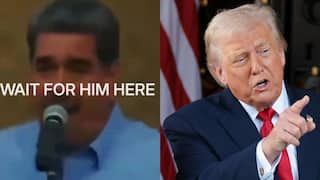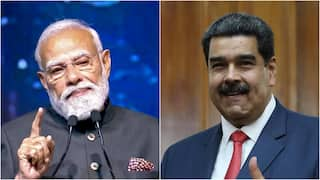What Is PM Modi's Relation With Adani?: Rahul Gandhi Counters Govt Attack Over His London Speech
Rahul Gandhi on Thursday said his speech on industrialist Gautam Adani was expunged despite the fact that there was nothing in it that was not in the public domain.

Under fire from the BJP over his remarks in London over the state of democracy in India, Congress leader Rahul Gandhi on Thursday questioned Prime Minister Narendra Modi's ties with industrialist Gautam Adani. He also reiterated his stand that he was not being allowed to speak in Parliament. "If Indian democracy is functioning, I would be able to say my piece in Parliament tomorrow," Gandhi said.
"I am hopeful, but I don't think they [government] would allow me to speak in Parliament. They adjourned the House within a minute of my arrival in Parliament today," he said.
"In the morning, I went to Parliament and told the Speaker that I want to speak on the floor. Four ministers of the government levelled allegations against me... He was non-committal," he said. Gandhi said that it is now a "test of democracy" and it remains to be seen if he is granted the same space as the four ministers and allowed to speak in Parliament.
"My speech on Adani was expunged despite the fact that there was nothing in it that was not in the public domain. This was done to distract people as the government is scared," Gandhi said. "I have some questions for Prime Minister Modi about how Adani has been given the entire India-Israel defence relation. The question is, what is the relationship between the Prime Minister and Adani," he asked.
Gandhi also raised the issue of the Adani project in Sri Lanka. Last week, Foreign Minister of Sri Lanka Mohamed Ali Sabry was quoted as saying by news outlet The Hindu that the "Adani project in Sri Lanka is like a government-to-government deal".
Sabry said that the Indian government singled out the Adani Group for infrastructure ventures, such as the Northern Sri Lanka wind power project. In addition to their involvement in renewable energy initiatives in the region, the Adani Group is also playing a role in the development of the West Container Terminal project, valued at $700 million, at the Colombo Port.
According to Ali Sabry, his government was highly optimistic about the Adani Group's ability to complete these undertakings, despite the conglomerate's loss of more than $145 billion within a month after Hindenburg Research LLC released a report, alleging several irregularities in the group's transactions.
Gandhi on Thursdsay again raised questions on the Adani Group's defence manufacturing contract with Israel. In his February 7 Lok Sabha speech, which was expunged, Gandhi had accused Adani Defence & Aerospace of securing a contract through a Memorandum of Understanding (MoU) with Israeli drone-maker Elbit. He had alleged that the deal was connected to PM Modi's 2017 visit to Israel. He claimed that Adani had no prior experience in making drones, unlike HAL and other companies. Israeli envoy to India Naor Gilon later defended the tie-up, saying the Israeli government does not pressure private corporations to form joint ventures. He said that Israel had signed contracts for joint ventures with 80 Indian companies, including Tata, Bell, and Kalyani. Gilon stressed that joint ventures were private in nature and that one company should not be singled out for discussion.
Earlier in the day, Rahul Gandhi denied giving any anti-India speech during his UK visit. The Congress MP said he would speak inside Parliament "if they allow me to".
Rahul Gandhi's UK tour, where he delivered a lecture at his alma mater Cambridge University and spoke at UK Parliament, has triggered controversy back in India. The BJP has accused Rahul of insulting India's democracy on foreign land.
Congress has hit back at the ruling party, citing instances of Prime Minister Narendra Modi raising internal politics abroad.
Both Lok Sabha and Rajya Sabha proceedings have been disrupted for the fourth day in a row amid uproar and sloganeering over Rahul Gandhi's remarks.
During his week-long trip to the UK earlier this month, Gandhi alleged that the structures of Indian democracy were under attack and there was a "full-scale assault" on the country's institutions.
The former Congress president also told a group of British MPs in London that microphones are often "turned off" in Lok Sabha when an opposition member raises important issues.
"Our microphones are not out of order, they are functioning, but you still can't switch them on. That's happened to me a number of times while I am speaking," Gandhi had said.





































